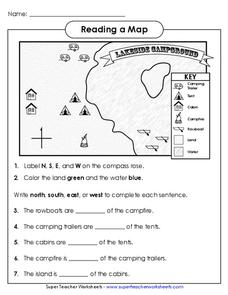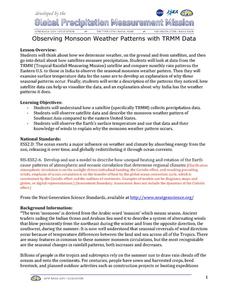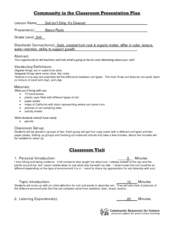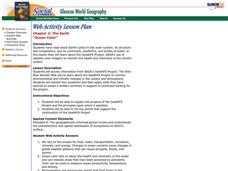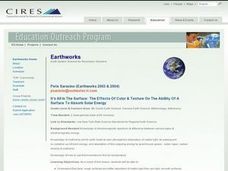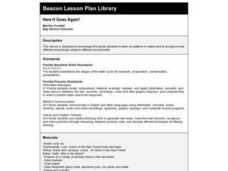Curated OER
Solar-Powered Prints
Combine art and science with this fabulous lesson plan where your class will create solar-powered artwork! They will create a cyanotype, using photo-sensitive paper, sun, and water. A list of necessary materials is provided.
Curated OER
Quarter Conservation
Here is another in the interesting series of lessons that use the special State Quarters as a learning tool. This one uses the California State Quarter. During this lesson, pupils learn the many ways they can conserve natural resources...
Curated OER
Grow an Alum Crystal
What an exciting lab experiment to conduct with your high school chemistry class! Crystals are formed naturally in the environment. However, allow your blossoming chemists to create their own unique crystals using alum and water. You may...
National Wildlife Federation
Quantifying Land Changes Over Time in Areas of Deforestation and Urbanization
Is qualitative or quantitative research more convincing when it comes to climate change? In the eighth lesson during this 21-part series, scholars begin by performing a quantitative analysis of deforestation and urbanization. Then, they...
Curated OER
Marine & Aquatic Habitats -- Journey of a Drop of Water Through a Watershed
Students discuss pollution and the steps in the hydrologic cycle. They follow a drop of water through a watershed simulation. They discover the components of a water cleaning system as well.
Curated OER
Michigan Quarter Reverse: A Coin Out of Water
Students examine the Michigan quarter reverse and differentiate between bodies of water. On copies of the quarter reverse, they color the land green and the water blue. After observing photos of water bodies, they complete a worksheet...
Curated OER
Water Is Life
In this science activity, students color in the picture that portrays the environmental message about the role and necessity of water to support life.
Super Teacher Worksheets
Reading a Map
Young geographers improve their map skills by practicing locating the cardinal directions on a map, identifying symbols on a map key, and describing where objects on the map are located relative to other locations.
Cornell University
Spectral Analysis with DVDs and CDs
Build a spectrometer to analyze properties of light. Scholars examine the spectrum from CDs and DVDs from two different light sources. Using the spectrum, they work to identify different elements.
NASA
Observing Monsoon Weather Patterns with TRMM Data
Follow a fabulous slide show on how monsoons form and how satellite technology is being used to observe the phenomena, explaining why they occur. Afterward, visit the TRMM (Tropical Rainfall Measuring Mission) website to access actual...
Star Date
Modeling the Night Sky
Dramatize the stars and planets as they become a visual representation of the solar system in this activity. Young astronomers track and simulate various constellations as they orbit the Earth to learn the position and motion of objects...
PBS
Blow the Roof Off!
Blow the minds of young scientists with this collection of inquiry-based investigations. Based on a series of eight videos, these "hands-on, minds-on" science lessons engage young learners in exploring a wide range of topics from making...
Curated OER
Watersheds: The San Francisco Bay Watershed
Sixth graders make a model of a watershed. For this geography lesson, 6th graders view a shaded relief map of California and locate landmarks. Students examine the San Francisco Bay Watershed by following the journey of water through the...
Curated OER
Soil Isn't Dirty; It's Diverse!
Second graders participate in a soil activity. In this soil instructional activity students complete a worksheet describing different soil types and the organic and inorganic things found in them.
Curated OER
Map of India
In this map of India activity, students label the capital city, the bodies of water and the compass points, then color the surrounding colors according to directions.
Curated OER
Stream
Students examine stream waters. In this scientific inquiry lesson, students "explore" wetlands as they participate in a demonstration that reveals information about steam waters and insects.
Curated OER
Chinese Dragons
Learners use texture, line, shape, pattern and color to create their own dragons to celebrate Chinese New Year.
Curated OER
Ocean Color
Students examine NASA's SeaWiFS Project Web site to explore how the SeaWiFS Project monitors environmental and climatic changes in the oceans and atmosphere. They answer questions and write a summary in support of continued funding for...
Curated OER
Color It Recycled!
Students melt old crayon stubs and mold them into interesting shapes and characters. They can add paper clips to created hanging ornaments!
Curated OER
Virus Tracker
Sixth graders will simulate the spread of a virus such as HIV through a population by "sharing" (but not drinking) the water in a plastic cup with several classmates. Although invisible, the water in a few of the cups will already be...
Curated OER
Color Garden
Pupils brainstorm types of flowers and the colors they can be. They are to keep a chart of the ones mentioned. They create their own paper flower garden on the bulletin board and examine books about flowers.
Curated OER
It's All In The Surface: The Effects Of Color & Texture On The Ability Of A Surface To Absorb Solar Energy
Ninth graders examine how dark surfaces absorb more light than light surfaces. They perform an experiment that compares various surfaces abilities to absorb heat, then record and analyze the results.
Baylor College
Tools of Magnification
Life science learners need to be able to use a microscope. With this comprehensive resource, they first experience how lenses and magnification work, and then get familiar with using a compound microscope. Tremendous background...
Curated OER
Here It Goes Again!
First graders work on patterns in nature and to recognize how different living things adapt to different environments such as the rain forest.









